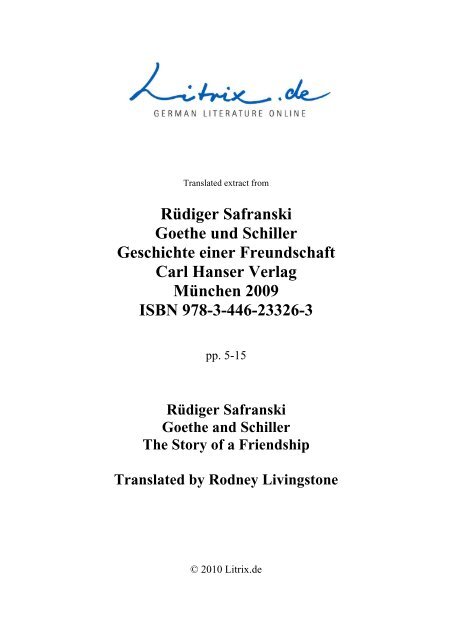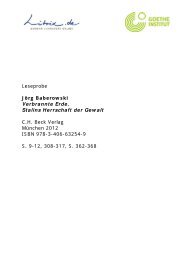Rüdiger Safranski Goethe und Schiller Geschichte einer ...
Rüdiger Safranski Goethe und Schiller Geschichte einer ...
Rüdiger Safranski Goethe und Schiller Geschichte einer ...
You also want an ePaper? Increase the reach of your titles
YUMPU automatically turns print PDFs into web optimized ePapers that Google loves.
Translated extract from<br />
<strong>Rüdiger</strong> <strong>Safranski</strong><br />
<strong>Goethe</strong> <strong>und</strong> <strong>Schiller</strong><br />
<strong>Geschichte</strong> <strong>einer</strong> Fre<strong>und</strong>schaft<br />
Carl Hanser Verlag<br />
München 2009<br />
ISBN 978-3-446-23326-3<br />
pp. 5-15<br />
<strong>Rüdiger</strong> <strong>Safranski</strong><br />
<strong>Goethe</strong> and <strong>Schiller</strong><br />
The Story of a Friendship<br />
Translated by Rodney Livingstone<br />
© 2010 Litrix.de
CONTENTS<br />
Prologue<br />
Chapter One<br />
First meeting in 1779. Prize-giving at the Karlsschule. The student and the<br />
famous visiting poet. Storm and Stress: the spirit of the age. <strong>Goethe</strong>’s and<br />
<strong>Schiller</strong>’s character. <strong>Goethe</strong> discovers the intermaxillary jawbone, <strong>Schiller</strong><br />
discovers freedom. The Robbers leapfrog mankind. Iphigenie calms man<br />
down. The desire to have an effect, in moderation and without.<br />
Chapter Two<br />
Flight and transformation for both men. <strong>Schiller</strong> escapes from Duke Karl<br />
Eugen of Württemberg and ends up in Weimar. <strong>Goethe</strong> escapes to Italy.<br />
<strong>Schiller</strong> in Weimar among the gods and the idolaters. <strong>Goethe</strong> in absentia.<br />
Everyone waits for him, including <strong>Schiller</strong>.<br />
Chapter Three<br />
<strong>Schiller</strong> and Charlotte von Lengefeld. A summer of love together with<br />
antiquity. Encounter with <strong>Goethe</strong> at the Lengefelds. <strong>Goethe</strong> remains<br />
1
eserved. <strong>Schiller</strong>’s love-hate. Two love stories. Christiane and Charlotte:<br />
<strong>Goethe</strong> marries beneath him, <strong>Schiller</strong> above him.<br />
Chapter Four<br />
<strong>Goethe</strong> and <strong>Schiller</strong> find the French Revolution a challenge. <strong>Schiller</strong>’s<br />
pathos in a nutshell. View of the ocean of mankind. <strong>Goethe</strong> forms his own<br />
circle. The great art of ignorance. Opposition to an over-excited age.<br />
<strong>Goethe</strong>’s art as refuge and <strong>Schiller</strong>’s playing fields of revolution. Dignity<br />
and Grace. Nature’s blue-eyed boy takes offence.<br />
Chapter Five<br />
<strong>Schiller</strong>’s trip to Swabia. Association with Cotta. Fo<strong>und</strong>ing the journal Die<br />
Horen. Literary matters. Invitation to <strong>Goethe</strong>. A turning point in <strong>Goethe</strong>’s<br />
life. The happy event: the meeting in summer 1794. <strong>Schiller</strong>’s great birthday<br />
letter. The first exchange of ideas. <strong>Schiller</strong>’s first visit to <strong>Goethe</strong>’s house in<br />
the Frauenplan.<br />
Chapter Six<br />
Collaboration on Wilhelm Meister. The ‘sentimental’ <strong>Schiller</strong> in the<br />
workshop of the ‘naïve’ genius. The play instinct. Audience reactions.<br />
2
<strong>Schiller</strong>… ‘when confronted by excellence, there is no freedom but in love.’<br />
<strong>Schiller</strong>’s suggestions and criticisms. Wilhelm Meister – just a happy stroke<br />
of fate?<br />
Chapter Seven<br />
Die Horen. Great ambitions. Two kinds of apolitical politics. <strong>Goethe</strong>’s social<br />
education and <strong>Schiller</strong>’s aesthetic education. <strong>Schiller</strong> infuriates Fichte. How<br />
much style does philosophy need? Die Horen in crisis. The Roman Elegies<br />
as sheet anchor. Quarrel with the Schlegels. The end of Die Horen.<br />
Chapter Eight<br />
<strong>Goethe</strong> in Jena. Pictures of a friendship. Charlotte and Christiane. Taking<br />
leave of a disorderly love life. <strong>Schiller</strong> and Christiane by moonlight. Men in<br />
conversation on the commanding heights of literature. The Xenia. <strong>Schiller</strong>,<br />
Egmont and cruelty. 1797 - The summer of ballads.<br />
Chapter Nine<br />
Hermann and Dorothea. <strong>Goethe</strong> plans his third Italian journey. <strong>Schiller</strong><br />
wants to hold him back. Hölderlin between the two masters. <strong>Goethe</strong>’s auto-<br />
3
da-fé before his departure. The dialogue in letters about symbolic<br />
perception. <strong>Goethe</strong> on <strong>Schiller</strong>’s track in Swabia. The idea for William Tell.<br />
Chapter Ten<br />
<strong>Goethe</strong>’s inspiration dries up. <strong>Schiller</strong>: writer’s block and creative frenzy.<br />
The philosophy stall shuts up shop. The aesthetic mood. Wallenstein.<br />
Triumphant return to the theatre. <strong>Goethe</strong> helps and admires. The idea of the<br />
totality of the world in its vastness. <strong>Schiller</strong> in the garden house.<br />
Chapter Eleven<br />
Epic and drama. After <strong>Schiller</strong>’s Horen, <strong>Goethe</strong>’s Propyläen. Never-ending<br />
antiquity. The collector and his collections. A family romance. Group<br />
picture with <strong>Schiller</strong>. How much reality can art bear? The pleasure of<br />
creating schematic patterns. Against dilettantism. Fichte’s expulsion from<br />
Jena. <strong>Schiller</strong>’s move to Weimar.<br />
Chapter Twelve<br />
Weimar dramaturgy. Against the unnatural and the all-too-natural. Duke<br />
Karl August’s taste. Translation exercises: <strong>Goethe</strong>’s Voltaire, <strong>Schiller</strong>’s<br />
4
Shakespeare. <strong>Goethe</strong> as friend and superior. Maria Stuart. How much<br />
religion and which one to choose? Faust and the rule of force.<br />
Chapter Thirteen<br />
<strong>Goethe</strong> has too much world, <strong>Schiller</strong> too little. Romantic affairs in the<br />
Schlegel household. The triangle <strong>Goethe</strong>, Schelling and <strong>Schiller</strong>. <strong>Schiller</strong>’s<br />
Maid of Orleans and <strong>Goethe</strong>’s Natural Daughter. The Kotzebue affair.<br />
Discord between <strong>Schiller</strong> and <strong>Goethe</strong>.<br />
Chapter Fourteen<br />
<strong>Schiller</strong>’s theatrical successes. Ban on cheering. <strong>Goethe</strong> cedes the William<br />
Tell story to <strong>Schiller</strong>. The conservative revolutionary. Mme de Staël in<br />
Weimar. The offer from Berlin. <strong>Goethe</strong> keeps <strong>Schiller</strong> in Weimar. Last<br />
works. The confidence-trickster motif. Demetrius and the translation of Le<br />
neveu de Rameau. <strong>Schiller</strong>’s death.<br />
Epilogue or <strong>Schiller</strong>’s second career in the spirit of <strong>Goethe</strong>.<br />
Bibliography<br />
5
Notes<br />
Index of Persons<br />
6
Prologue<br />
Friendship in the true meaning of the word is rare. To Aristotle we owe the<br />
epigram: ‘my friends, there are no friends.’ Kant remarks, referring to<br />
Aristotle, that friendship’ conceived in its ‘purity’ and ‘completeness’ is<br />
doubtless no more than a ‘hobbyhorse of the novelists’. True friendship is at<br />
any rate rarer than the inflationary use of the word might suggest. <strong>Goethe</strong><br />
and <strong>Schiller</strong> thought of their friendship as a strange, rare growth, a stroke of<br />
fortune, a gift. They thought there was something incredible about what they<br />
had achieved between them, whether by good luck or good management,<br />
and they were both lost in wonder at it. Looking back, <strong>Goethe</strong> called<br />
friendship a lucky event. It remains just that for us today, since we would<br />
have to look long and hard at the history of the mind to find anything<br />
comparable – to discover two men of the greatest gifts, putting aside their<br />
differences and coming together for the stimulating exchange of ideas and<br />
even joint labour.<br />
Even at the time the friendship between the two was regarded as the<br />
stuff legends are made of. The two friends were transformed into princes<br />
among poets dwelling on a literary Olympus, and they were referred to as<br />
the ‘Dioscuri’. Envy and resentment were also unavoidable. If people felt<br />
7
unable to criticize either of them, they could at least play one off against the<br />
other, or rank them in a hierarchy. Who was the more important of the two<br />
or could both of them be overestimated? Officially, they were both soon<br />
revered as classics, sculpted in marble, but every generation produced its<br />
rebels. When <strong>Goethe</strong> published his correspondence with <strong>Schiller</strong> in 1829,<br />
Grabbe called it a ‘collection of cheap trivia’, and Börne wrote ‘that in their<br />
own homes our two greatest minds are nothing at all…it is a true<br />
miracle…the transformation of gold into lead.’<br />
<strong>Goethe</strong> and <strong>Schiller</strong> were prepared for the day when people would<br />
weary of them and they pre-empted this by practising the art of ro<strong>und</strong>ly<br />
abusing their audience. They thought of their friendship as an alliance that<br />
enabled them cheerfully to hurl heir th<strong>und</strong>erbolts at their literary<br />
contemporaries. <strong>Goethe</strong> and <strong>Schiller</strong> had been rivals before they became<br />
friends. <strong>Goethe</strong> felt oppressed by the fame the younger man had attracted. In<br />
his eyes, <strong>Schiller</strong> was initially nothing more than an unwelcome memory of<br />
his own Storm and Stress phase, which now lay behind him. For his part,<br />
<strong>Schiller</strong> regarded <strong>Goethe</strong> as a proud prude who needed to be made pregnant<br />
so as to humiliate him in the eyes of the world. Much had to change before<br />
<strong>Schiller</strong> could write, ‘How keenly I have felt that… when confronted by<br />
excellence, there is no freedom but in love’. While <strong>Goethe</strong> could write to<br />
8
<strong>Schiller</strong>: ‘You have procured for me a second youth and have made me a<br />
poet once more, a vocation I had as good as abandoned.’<br />
The full story of what had brought about this change is the subject of<br />
this book. How the young <strong>Schiller</strong> gazed upon the much admired <strong>Goethe</strong><br />
when he saw him for the first time as the Duke’s guest at the prize-giving at<br />
the Karlsschule. How the next few years produced curious parallel<br />
developments in the two men’s lives: flight and transformation for both of<br />
them. <strong>Schiller</strong> fled from Stuttgart and beyond the reach of Duke Karl Eugen.<br />
<strong>Goethe</strong> fled to Italy. Both men were liberated to pursue a new career as<br />
writers. Then there were two love relationships. <strong>Schiller</strong> and Charlotte,<br />
<strong>Goethe</strong> and Christiane. <strong>Goethe</strong> fell in love and committed himself to a<br />
woman beneath him socially; <strong>Schiller</strong> did likewise, though in his case,<br />
Charlotte was above him socially. This was followed by the laborious<br />
process of coming closer to one another. <strong>Schiller</strong> made tentative approaches<br />
to <strong>Goethe</strong>, while the latter kept his distance. Then, in Jena, in the summer of<br />
1794, came the real breaking of the ice. That is when the correspondence<br />
begins, probably the most important joint endeavour of the two men and the<br />
most important source for this book. Their friendship lasted from 1794 to<br />
<strong>Schiller</strong>’s death in May 1805. The polar opposites of character and<br />
temperament led in both men to an intensification of their creative powers,<br />
9
in <strong>Goethe</strong>’s case during the first few years of their friendship, in <strong>Schiller</strong>’s in<br />
its last years.<br />
Montaigne regards a successful friendship as a process in which ‘two<br />
souls are fused’. But this was not the case with <strong>Goethe</strong> and <strong>Schiller</strong>. They<br />
were by no means absolutely of one mind and it was to the benefit of both<br />
that they attempted no such thing. Given their very different natures, this<br />
could have led only to disappointment. <strong>Goethe</strong> abided by the maxim he had<br />
formulated in December 1798 in a letter to August Herder: ‘If only we were<br />
more circumspect and attached ourselves to friends only from that side of<br />
them that truly harmonizes with us, while ignoring the rest of them,<br />
friendships would be far more enduring and <strong>und</strong>isrupted. Normally,<br />
however, it is a delusion of youth, which we do not rid ourselves of even in<br />
old age, that we expect a friend to be, as it were, another self, that he should<br />
form a whole with us, a notion that we deceive ourselves about for a while,<br />
but which cannot last.’<br />
<strong>Goethe</strong> had initially allowed only one side of himself to become<br />
attached to <strong>Schiller</strong> and <strong>Schiller</strong> likewise was careful not to place too much<br />
weight on the relationship. But what bo<strong>und</strong> them to each other was<br />
important enough. It was in fact the most important thing of all: the effort<br />
they expended on their own writings, which in their friendship became a<br />
10
shared endeavour. The pleasure they derived from feeling that this was at all<br />
possible enabled them to go beyond a merely one-sided contact.<br />
Nevertheless, the work relationship remained the basis and the core. To lend<br />
each other assistance and encourage each other through the intensive<br />
exchange of ideas and feelings – that was the declared purpose of their<br />
friendship. Inclination, even love, <strong>Goethe</strong> remarked, contributes little to<br />
friendship; a true, productive friendship consists in going through life in step<br />
with one another, so that a friend can approve of my aims and I of his, and<br />
we can go forward together. <strong>Schiller</strong> calls such a friendship a relationship<br />
built on reciprocal perfectibility, and <strong>Goethe</strong> observed that if he wanted to<br />
sum up the benefits of a friendship, he would say it had enabled him to<br />
progress. So what we have, then, is an alliance for mutual assistance while<br />
working away at oneself, a common enterprise for self-improvement. The<br />
history of the friendship between <strong>Goethe</strong> and <strong>Schiller</strong> is a practical test of<br />
the idea of education in the German classical age.<br />
<strong>Goethe</strong> once confessed that the maxim ‘know thyself’, which so<strong>und</strong>s<br />
so significant and canonical, had always appeared suspect to him because<br />
when examining yourself, you can never quite determine whether what you<br />
see is truly there or has been invented. He recommends making a detour via<br />
the world since man knows himself only in so far as he knows the world and<br />
11
is known by it. For this reason, <strong>Goethe</strong> went on, instead of losing his way in<br />
his internal hall of mirrors, he had made a practice in his later years of<br />
directing his attention to ensuring that ‘others might recognize me so that<br />
through them I might obtain greater clarity about myself and my inner<br />
being’. In this respect, meeting <strong>Schiller</strong> must have been a great stroke of<br />
good fortune for him. A better mirror than <strong>Schiller</strong>, that genius of reflection,<br />
he could not have fo<strong>und</strong>. <strong>Goethe</strong> made use of <strong>Schiller</strong> to shed some light on<br />
the riches of his inner life. Why was this inner life so rich? Quite simply<br />
because he had absorbed so much from the external world. Every new<br />
object, contemplated fully, opens up a new organ in us. The reverse is true of<br />
<strong>Schiller</strong>. He complained about his lack of worldly experience. He wrote to<br />
<strong>Goethe</strong> in 1795: ‘I often find it strange to think of how you have been hurled<br />
into the world, while I sit surro<strong>und</strong>ed by my paper windowpanes with<br />
nothing before my eyes but paper.’ <strong>Schiller</strong>, surro<strong>und</strong>ed by his paper<br />
windowpanes, had a surplus of reflexivity. The weight of his experience did<br />
not quite match his intellect. He could make his mind available to his friend<br />
to use as a mirror and to tap his experience of life. <strong>Goethe</strong> could offer him an<br />
entire continent, and if he could not appropriate it, he could at least explore<br />
it. Moreover, <strong>Goethe</strong>, with his genius for intuition, could inspire him with<br />
confidence in his own unconscious powers. Only through his friendship with<br />
12
<strong>Goethe</strong> did <strong>Schiller</strong> learn that a man’s creative powers are rooted in a realm<br />
that by its very nature cannot be grasped by conceptual thinking. The two<br />
men complemented each other to a miraculous degree; the one took care of<br />
clarity and consciousness, the other of the creative links to the opaque and<br />
the unconscious. Their common ideal was to bring the two regions together<br />
– idea and experience, freedom and nature, concept and ambiguity. They<br />
themselves dubbed it the ‘classical’ – and posterity emphasized this even<br />
more than they had done. In this way, the two friends took pleasure in each<br />
other and made use of one another. ‘Keep on introducing me to my own<br />
works,’ <strong>Goethe</strong> wrote and <strong>Schiller</strong> replied: ‘The mercurial nature of your<br />
imagination amazes and delights me, and even if I cannot follow your<br />
example, it is pleasurable and profitable for me to see what you have done.’<br />
When <strong>Schiller</strong> died, <strong>Goethe</strong> realized that an epoch of his life had<br />
come to a close. The bonds between them had become so intimate that<br />
<strong>Goethe</strong> was able to confess to Zelter, the friend of his later years, ‘I thought I<br />
had lost myself and find that I have now lost a friend and with him half my<br />
life.’ <strong>Schiller</strong> died without being able to pass a final judgement on this<br />
period of their friendship. He died in the midst of his own work, and the<br />
work they did together. He was busy engaged on looking through <strong>Goethe</strong>’s<br />
notes on Diderot’s Neveu de Rameau. In his last letter, he wrote,<br />
13
‘Meanwhile, I find myself in some disagreement with you on this point.’<br />
Their friendship has many dimensions and is rich in the stories it gives rise<br />
to. This explains why so much can be done with it.<br />
14



![PDF anzeigen [65 KB]](https://img.yumpu.com/21718989/1/184x260/pdf-anzeigen-65-kb.jpg?quality=85)


![show PDF [5522 KB]](https://img.yumpu.com/21308533/1/184x260/show-pdf-5522-kb.jpg?quality=85)
![PDF anzeigen [36 KB]](https://img.yumpu.com/21240334/1/184x260/pdf-anzeigen-36-kb.jpg?quality=85)

![Mostrar PDF [68 KB]](https://img.yumpu.com/14286441/1/184x260/mostrar-pdf-68-kb.jpg?quality=85)






